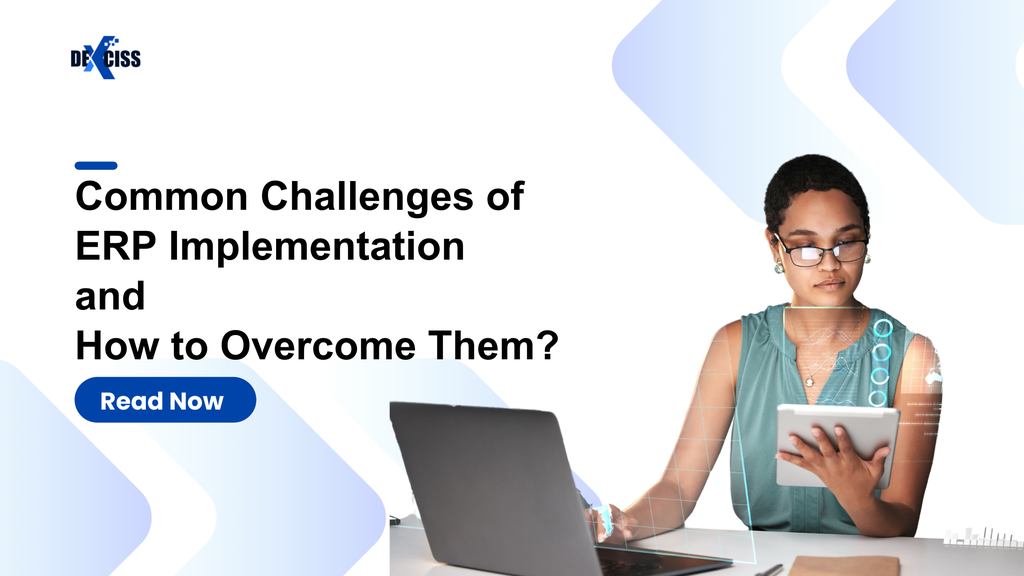Dexciss Technology - Common Challenges of ERP Implementation and How to Overcome Them?
Implementing an Enterprise Resource Planning (ERP) system is a major undertaking for any organization. While the benefits of a successful ERP implementation can be immense, there are several common ch

ERP Implementation Challenges and their solution
- Identifying Processes for Integration:
One of the initial challenges of ERP implementation is identifying which processes and systems should be integrated. This can be particularly challenging for organizations with disparate departments and systems. For example, a manufacturing company may have separate systems for inventory management, production planning, and financials. Integrating these systems with an ERP solution can streamline operations and provide a unified view of the organization's data.
To overcome this challenge, businesses should conduct a thorough analysis of their current processes and systems. They should identify areas where integration can improve efficiency and reduce manual work. For example, by integrating inventory management with production planning, a company can ensure that production is aligned with available inventory levels, reducing stockouts and excess inventory.
- Lack of System Flexibility:
Another common challenge is the lack of flexibility in ERP systems. Some ERP systems may be rigid and require organizations to adapt their processes to fit the software. This can lead to inefficiencies and resistance from employees who are used to working in a certain way.
To address this challenge, businesses should carefully evaluate ERP systems to ensure they meet their specific requirements. For example, a company that operates in a highly regulated industry may require an ERP system that can easily adapt to changing regulations. By choosing a flexible ERP system, businesses can ensure that the software can evolve with their needs.
- Resistance to Change:
Resistance to change is a common challenge in ERP implementation, as employees may be accustomed to existing systems and processes. This resistance can manifest in various forms, such as reluctance to adopt new software or skepticism about the benefits of ERP.
To overcome resistance to change, businesses should invest in comprehensive training programs for employees. Training should not only focus on how to use the new ERP system but also on the benefits it can bring to the organization. Additionally, involving employees in the implementation process and soliciting their feedback can help to create a sense of ownership and reduce resistance.
- Choosing the Right Vendor:
Selecting the right ERP vendor is critical to the success of an implementation. Choosing the wrong vendor can lead to restricted functionality, poor support, and increased costs. To avoid this, businesses should conduct thorough research and evaluate multiple vendors based on their specific needs.
For example, a company that requires extensive customization may prefer a vendor that offers a high level of customization and support. On the other hand, a company that values ease of use and quick implementation may prioritize vendors that offer out-of-the-box solutions.
- Maintenance Costs:
All ERP systems require regular maintenance, which can incur significant costs. Failure to account for these costs can lead to budget overruns and financial strain on the organization. To mitigate this risk, businesses should carefully consider the total cost of ownership (TCO) of an ERP system, including maintenance and support costs.
Businesses should also ensure that their chosen vendor can provide adequate support for the ERP system. This includes not only technical support but also updates and patches to keep the system secure and up to date.
- Underutilization of Key Features:
Despite the investment in an ERP system, businesses often fail to fully utilize its key features. This can result in missed opportunities to automate processes, improve efficiency, and gain a competitive advantage.
To address this challenge, businesses should invest in ongoing training and education for employees. This can help employees to understand the full capabilities of the ERP system and how it can be used to improve their work. Additionally, businesses should regularly review their processes and systems to identify areas where the ERP system can be further utilized.
Enhance Your ERP Implementation Journey with Dexciss' ERPNext Services
As you navigate the challenges of ERP implementation, trust Dexciss Technology to be your guiding partner. Our ERPNext implementation services are designed to address the common challenges outlined in this blog, ensuring a smooth and successful transition. From identifying processes for integration to overcoming resistance to change, our experienced team will provide the expertise and support you need at every step. With Dexciss, you can maximize the flexibility, efficiency, and effectiveness of your ERP system, ultimately driving your business towards greater success.
Contact us today to learn more about how Dexciss can support your ERP implementation journey.
No comments yet. Login to start a new discussion Start a new discussion